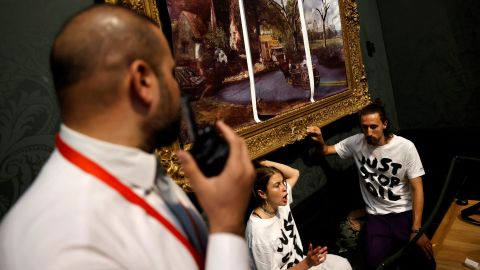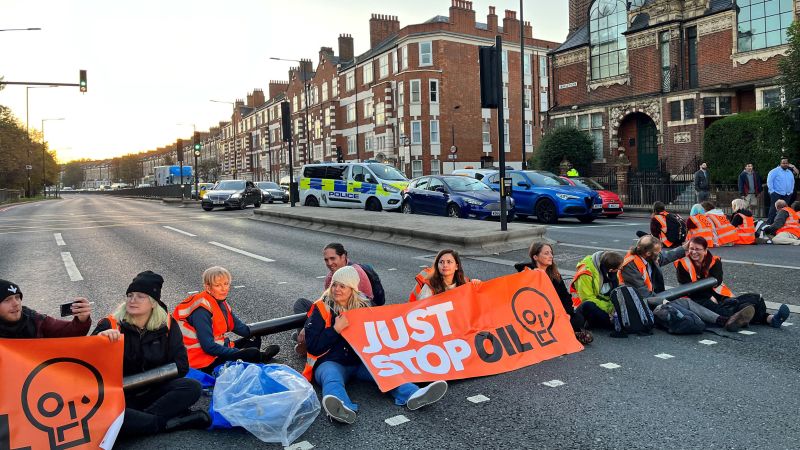The British government wants to hand police unprecedented powers to handle protesters. Human rights activists say it’s an affront to democracy | CNN
London
CNN
—
The British government wants to hand new powers to police that would allow officers to take stronger action against people engaging in peaceful, political protest.
Human rights activists have accused the government of trying to suppress freedom of speech, while opposition politicians claim that Downing Street is simply trying to distract from the myriad of things going wrong in the United Kingdom at the moment.
The government issued a statement on Sunday night, in which it said it would table amendments to legislation that is already passing through Parliament called the Public Order Bill. This has already been the subject of huge controversy due to the extent to which it curbs protest.
Specifically, the bill nakedly targets groups such as Black Lives Matter, Extinction Rebellion and Just Stop Oil, all of which have used disruptive tactics in their protests against the government.
The bill would criminalize long-standing protest tactics such as locking on (where protesters physically attach themselves to things like buildings) and tunneling (literally digging tunnels), and could force people who protest regularly into wearing electronic tags. The new amendment would also give police the power to shut down protests before any disruption even occurs.
UK Prime Minister Rishi Sunak said: “We cannot have protests conducted by a small minority disrupting the lives of the ordinary public. It’s not acceptable and we’re going to bring it to an end.”
The head of London’s Metropolitan Police Service, Mark Rowley, also issued a statement, in which he made clear that the police had not asked the government for more powers to curb protests.
Adam Wagner, a leading human rights lawyer, thinks this might be due to the fact there is actually very little to be gained in all of this for the police.
“The police already have to decide which protests to get involved with and which to leave alone. Whatever they do, they will get criticized and ideally they would probably rather have less to do with policing protests and the bad publicity that comes with it,” Wagner told CNN.
Critics of the government’s move point out that officers already have the ability to handle protests that get out of hand and are disruptive.
“The police have been very clear that they have the power to adequately deal with protests and manage protests when they are going to cause unjustified disruption and that’s been the case for decades,” Yasmine Ahmed, UK director of Human Rights Watch (HRW), told CNN.
“Our right to protest is fundamental, especially at a time when we are in the grip of a cost-of-living crisis, a climate crisis and our public health service is on its knees. Instead of helping people who are below the poverty line – people who are in work, including nurses – the government is wasting time crushing dissent,” Ahmed added.
Wagner believes that the bill could lead to the government being taken to court over allegations of breaching human rights law.

“(In) breaking up peaceful protest you are getting right to the core of human rights law. Direct action groups like Black Lives Matter and Extinction Rebellion are not doing much different to what we saw in the civil rights movement or from the Suffragettes. To get some issues on the national agenda you have to be disruptive and people who do that should be tolerated as they are protected in law,” he said.
Conservative MPs are on the whole publicly supporting the government, but privately some concede that making amendments to make the bill even stronger could have something to do with the fact that the Conservative Party is trailing in opinion polls.
This allegation has been made of the government on a number of policies, such as its controversial plan to deport asylum seekers to Rwanda, its efforts to make it harder for unions to declare strike action and a law that protects statues and national monuments.
“It is politically convenient to put the opposition on the side of all these other issues and remind the public that Labour (the official opposition) is funded by the unions,” a senior Conservative told CNN.
While issues like these might be controversial, just being willing to have the argument is something that could help the Conservative Party as it tries to rebuild its base before the next general election.
Multiple polls suggest that the public generally opposes disruptive protest and the Conservative Party has become very good over the past few years at weaponizing wedge issues, such as Euroskepticism, immigration and protecting statues of Winston Churchill.

There is no doubt that these issues put Labour in a tricky spot. On one hand, to have broad appeal they have to support the police and not appear to be on the side of disruptive protesters. On the other, they still have to oppose the government.
Sarah Jones, Labour’s shadow minister for policing, said in a statement that the police “have powers to deal with dangerous, disruptive protests and Labour backs them to use those powers… But the Prime Minister has spent more time talking about protest than he has the epidemic of violence against women and girls or his government’s shameful record prosecuting criminals.”
This might be a fair criticism of the government and prime minister, but is a less clear and clean message than simply saying “protests are bad and we will stop them.”
It’s not clear that the government will receive much of a boost from cracking down harder on demonstrators, especially if the new legislation leads to lots of messy scenes where peaceful protesters are being hauled away by an increasingly unpopular police force.
But beyond the politics, this Public Order Bill has left Ahmed, of HRW, questioning what sort of a country Britain really wants to be in 2023.
“When people argue that the government have a right to stop protests, well that’s what China says, that’s what Russia says, that’s what Myanmar says,” she said. “We wouldn’t live in the democracy we have today if people didn’t have the right to protest and disrupt things.”




